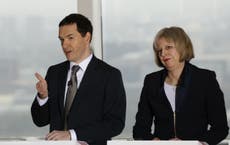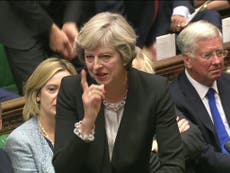Theresa May is the new Gordon Brown – indecisive, obsessive and slow
Her closed and slow way of working has added a new layer of uncertainty for business, on top of that caused by the Brexit vote


I tried to compile one of my lists the other day, of the Top 10 ways in which Theresa May is like Gordon Brown. With the help of two former special advisers to Labour ministers, Clare Montagu, who worked for Alan Johnson, and David Mills, who worked for Liam Byrne, we came up with the following.
Attempt to differentiate from flashy predecessor – remember “not flash; just Gordon”? Indecisive. Unable to delegate. All over the detail. Big on control and loyalty. Sketchy alternative vision, more a matter of mood and tone than policy. Father was a clergyman.
Well, that is seven ways in which she is a Brownite, and they lead to more similarities.
She is enjoying quite a warm bath in opinion-poll ratings. For a Conservative prime minister to be better rated in Scotland than the Scottish National Party first minister is not something I expected to see in my lifetime.

All May has to do, then, to avoid Brown’s sudden descent into the pit of polling disaster, is to not call off an election that everyone expects her to call. Given that no one now expects her to go to the country this autumn, she is well placed to manage that. She now seems unlikely to have an election next year either, so she may be like Brown in going for all the rest of a parliament. However, it may be other parallels with Brown that bring her honeymoon to an end.
Disconcerting reports of the Prime Minister’s working style have been seeping from Downing Street. I am told that, as it was under Brown, anything that goes to No 10 slows down. Her indecision and obsession with detail are like his, although there are also differences between them. One of the problems with Brown was his unconventional way of working by email and informal conversations with a wide range of people. She is more traditional and paper-based in her methods, consulting a small inner circle – but she doesn’t work such long hours.
Her closed and slow way of working has added a new layer of uncertainty for business, on top of that already caused by the Brexit vote. Business leaders dealing with government have been told that understandings reached before 13 July were with the “old government”, and that they have to wait to see what the “new government” thinks.
Hinkley Point and Heathrow are two obvious examples – the Hinkley nuclear power station was re-approved on Friday, with some minor new conditions, and a decision on new runways has been postponed yet again, to avoid trouble at Conservative Party conference next month. In both cases, caution may be sensible, although it may yet cause the Hinkley deal to unravel. EDF, the French energy company, could still walk away from it, which would be a big embarrassment.
The clunkiness of May’s working style is reflected in her appearances at the despatch box. It was quite an achievement to come off worse against Jeremy Corbyn on just her third outing at Prime Minister’s Questions. This does not bode well for her. Brown at least held his own against David Cameron, a more dangerous opposition leader.
The most alarming thing about PMQs on Wednesday was the silence and squirming on the Tory benches: her proposal to extend selection in schools united her opponents and split her own side. This is not something she can afford to do. Like Brown, she inherited a divided party and a divided Cabinet. Like Brown, she is “big on loyalty”, which is a polite way of saying that she has a factional approach to politics that can be counter-productive.
That is why I thought she was unwise to humiliate George Osborne in her reshuffle. She could have allowed him to “resign” to allow her to present her government as fresh, and offered the prospect of a return. Instead, her people told journalists he had been lectured on his shortcomings and sacked.
The trouble with sacking ministers is that they don’t all leave the House of Commons as Cameron did on Monday. They are still there and May needs their votes. On Friday, Osborne returned to the Today programme, to give an interview of Mandelsonian menace. “I don’t want to write my memoirs because I don’t know how the story ends,” he said. Unlike his friend the former prime minister, he would be “staying in the House of Commons … to draw attention to the issues and causes I care about.” Would that mean he would be a distraction for the Government? “Not necessarily.”
May could have handled Nicky Morgan, sacked as Education Secretary, better too. Her unhappiness surfaced on Wednesday when she praised Cameron saying “he appealed to parts of the country which we hadn’t appealed to as a party before ... And Theresa probably isn’t going to reach into those parts in the same way”.
It is one thing to be factional if you have a faction of your own, like the Brownites, but she doesn’t even have that. Yet, like Brown, she has an ideologically divided Cabinet. Just as Brown brought in Blairites (Peter Mandelson, Andrew Adonis) to create a broad-based government, she has promoted the Vote Leavers.
So far this has meant that Liam Fox and David Davis cancel each other out, while Boris Johnson as Foreign Secretary has established himself as leader of the hard Brexit faction. Nor is that all; because there are other ideological divisions in the Cabinet. Philip Hammond, the Chancellor, apparently argued “fearlessly” in Cabinet committee on Thursday against May’s economic populism, namely her plans for worker directors, curbs on executive pay and restrictions on foreign takeovers.
None of this matters very much yet, because being a “new government” gives May a lot of space to dissemble. But it will do. Or, rather, it would do if the Labour Party were ever to offer the semblance of a credible alternative government.






Join our commenting forum
Join thought-provoking conversations, follow other Independent readers and see their replies